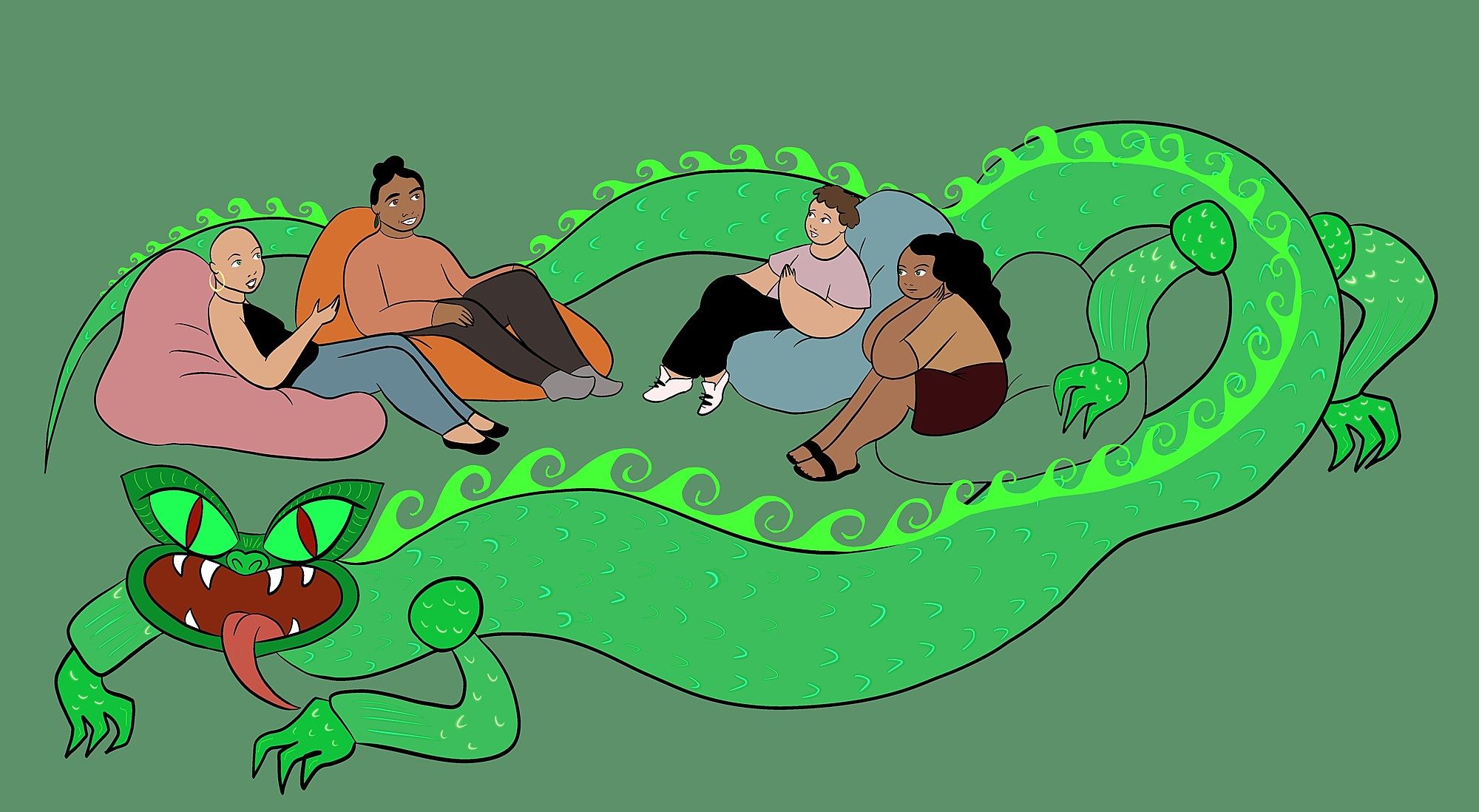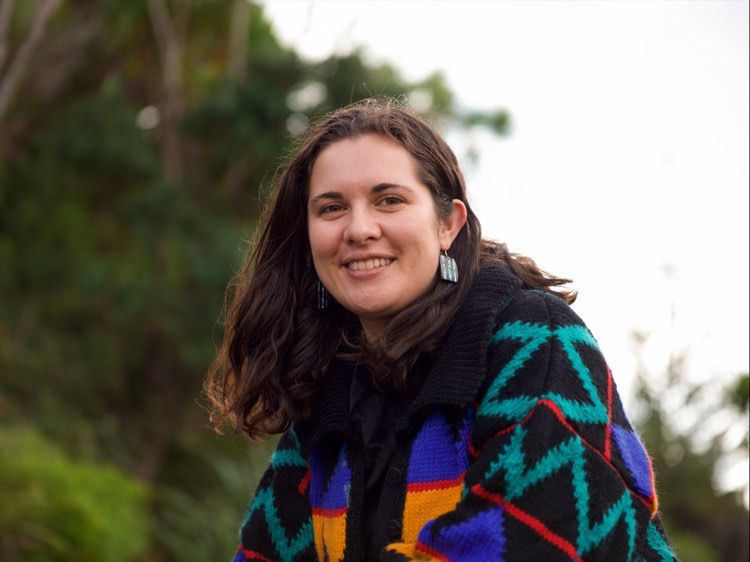Next Gen of Taniwha
At the NATIVE Minds sessions at the Māoriland Film Festival a call went out: It’s time for rangatahi to bring themselves to the table.
When we arrived at the Māoriland Film Festival, we were pointed towards a tent at the back of the main building, past the māra, where we fell gratefully into beanbag chairs and settled in to listen. The tent became abuzz with kōrero, and we relaxed into it.
The NATIVE Minds sessions at the Māoriland Film Festival are a space for Indigenous creatives to share what’s on their native minds — an opportunity for Indigenous filmmakers to express their whakaaro about working in the film industry. These are the kinds of urgent conversations that Indigenous creatives need to be having right now. This year there were four panel discussions throughout the day, with time allowed in between for reflection, kai and some all-important Ōtaki op-shopping. There is time to wānanga and unpack what the discussions have brought to the surface, as well as space to sit, breathe and recharge.
One of my favourite things to do, since I was young, was to sit at the table with my nanny and aunties, and listen to them talk. They’d burst into laughter or tears, sharing gossip and memories from long before I was born. Even now, when I visit my aunties, we talk for hours. And I sit there, absorbing everything. I love how their minds work, and how the stories they tell create vivid images in my brain.
Conversation is one of the ways we as Māori people make sense of the world
Conversation is one of the ways we as Māori people make sense of the world. In te ao Māori, we acknowledge the importance of te hā (the breath). Tāne pressed his nose against Hineahuone and breathed life into her mouth. The breath made life and language possible. Te hā is the vessel that carries our innermost thoughts, as words, into the physical world. As we sat in the tent at Māoriland, I could feel te hā carrying the kōrero into the air, filling the space with streams of spoken thought.
Tainui Stephens opened the space by explaining, “These NATIVE Minds sessions let us explore what’s on our native minds. They are just a chance to stimulate thinking – that’s all.” The panel discussions that followed explored a range of different kaupapa, from innovating in the time of Covid-19 to representing trauma; to how to embrace new technologies to tell our stories. Here, Indigenous filmmakers and artists could explore important issues without being expected to come up with ‘answers’ for creative problems.
The conversations were thought-provoking, and sometimes tough. One of the main threads was the question of where we are going next, and how Māori and Indigenous filmmakers can respond to the current world climate in ways that expand and progress our cultures.
Digital natives are unicorns … but they’re also taniwha in this industry, in a positive way
The guiding light for the creatives on the panels was the future generation. Almost all of the panellists discussed the need for young people to be entering the film industry and telling their stories. Kath Akuhata-Brown implored a younger audience member to bring themselves to the table and be present. “If you didn’t wait and brought yourself to the table now, I wouldn’t have to be there … The levels of unpeeling you have to do are urgent.”
This call for rangatahi to step up and take their place was really encouraging. The support to foster a new generation of Māori creatives excites me, and reminds me that our generation does have a deep understanding of what’s going on in the world. We have stories to tell that are new and important, but we also have the older generations holding us up, ready to pass on the baton. There was also an acknowledgement, from many of the speakers, about the ongoing traumas of colonisation and the ways in which we have to keep unpeeling the layers of self-doubt and intergenerational pain in order to heal. This healing is necessary if we want to create space for ourselves in the creative industries.
Ani Oriwia Adds referred to this new generation of digital natives in the film industry as ‘unicorns’, able to navigate between different worlds. Cian Elyse White then built on this by saying, “Digital natives are unicorns … but they’re also taniwha in this industry, in a positive way.” Mulling on this later, I like to think she was speaking of the quiet power rangatahi have in navigating treacherous waters. Likening them to taniwha refers to the strength and skills we have to assert and protect themselves, as Māori, in the film industry.
When I think, for example, of films like Once Were Warriors,I see the real-world implications of how others perceive Māori
These days, we rangatahi are hyper-aware of the world around us and are incredibly tuned into world events, as well as being the catalyst for a whole wave of Indigenous activism worldwide. One of the rangatahi panellists, Eva Hakaraia, reflected on what it means to be a rangatahi now and talked about how the internet allows us to be more informed, and has therefore made us more politically conscious. “There’s a lot of stereotypes that we [rangatahi] are more sensitive. I think we’re just more aware. We’re more empathetic.” And empathy, as mentioned by other panellists, is an important tool when it comes to filmmaking. It allows us to help others understand our experiences of living in the world.
“Rangatahi know when to stand up and speak about what they don’t like,” said Ani. “But how can we be strategic about it? Being able to be emotionally connected to a character in a film is powerful … We need to be strategic about how we are political now.”
This idea of being strategic is important to keep in mind. Too often we forget how powerful it is to hold the pen. As a writer myself, I am constantly becoming more aware of the impact that words can have on the world, and am more consciously thinking about what kinds of stories I want to be telling, for the future of our people. Film has the power to shape our understandings of other people. It influences how we might think of others, or of ourselves. When I think, for example, of films like Once Were Warriors,I see the real-world implications of how others perceive Māori based on that film. We need to acknowledge that writing and filmmaking have a real impact. And we need to choose which stories to tell.
How can we tell our stories in a positive, mana-enhancing way?
“When you make an Indigenous story and are unashamedly proud of it as an Indigenous story, you are being political,” Cian reflected. The need for us to tell Indigenous stories ourselves was spoken about in depth. But this, it was acknowledged, is not without its complications. There is both a positive and negative momentum that comes with an increasing demand for Indigenous stories and knowledge. The positive side is that Indigenous things are popular again, which is exciting. And the negative side is that non-Indigenous people can get over excited about our cultures, and appropriate them without being critically aware.
This will become more complex as time goes on, but the need to protect and hold tino rangatiratanga over our own work and our own stories as Māori people is important. As we move into the new world, we must tread carefully.
The questions I kept coming back to throughout the sessions were: How should we as Māori creatives be responding to the world right now? How can we move forward as a culture and a people? And how can we tell our stories in a positive, mana-enhancing way?
I strongly believe that it is possible to change the world through storytelling
The NATIVE Minds sessions provoked a lot of thought in this area. They gave me nourishment and encouraged me to continue creating and reflecting as I go along my journey as a Māori writer. And I felt that I left NATIVE Minds thinking that we need more spaces like this. We need more opportunities to wānanga, in the truest sense of the word. To come together and share stories, reflect, debate and come up with new answers to questions that affect us, as Indigenous creatives. Contact with one another within the community – and collective sense-making – is important, as it is through collective discussion that we can make sense of the world.
One of the reasons I keep writing, in spite of any roadblocks I may come across, is that I strongly believe that it is possible to change the world through storytelling. And we are obligated to do this. We owe it to our tūpuna, and to our whānau, and the generations yet to come. As Cian so eloquently put it, “Māori are not a ‘me’ people, they are a ‘we’ people. … I don’t sit here alone, I sit here with all of my tūpuna.” And so we continue creating, as it’s not only for ourselves, it’s for all of those who have come before, and those who will come after.
When the last panel was done, we moved to another gazebo in the māra. This was a time to reflect, unwind and share a drink together after the busy day. Everyone was exhausted, but laughing, and sharing their whakaaro on what the discussions had brought up for them. It felt promising and joyous. I have so much hope for the future.
On the drive back from Ōtaki, we let the thoughts settle in. The words that were sent out on the winds followed us home. They wrapped around us, set into us, and became new thoughts. And we will keep discussing them, bringing them back to life with our breath, pondering, questioning. That is the nature of kōrero. We can use it to make sense of the world again and again.
The NATIVE Minds sessions were held as a part of the Māoriland Film Festival 2021. I want to thank the team at Māoriland for making this event possible. I also want to acknowledge all of the speakers for bringing their kōrero into the space – Tainui Stephens, Kath Akuhata Brown, Amber and Victor Naveira, Desray Armstrong, Marja and Ingir Bål Nango, Ani Oriwia Adds, Rautini Thompson, Cian Elyse White, Te Ao Kapa, Oscar Kightley and Eva Hakaraia.
Feature image: Jessica Thompson-Carr (Māori Mermaid)

